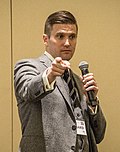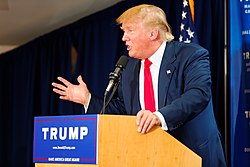Alt-right
The alt-right is a right-wing political movement originating in the United States.[1] There are many different type of people in the alt-right. They include white nationalists, antifeminists, manospherians, conservatives, Christians, nationalists and men's rights activists.[2] The group is said to have influenced the 2016 United States presidential election in favor of the winning candidate Donald Trump.[3] The term "Alt-right" is said to have been coined by Richard B. Spencer, who is a political writer and the current president of the nationalist think-tank National Policy Institute.[4]
The alt-right originated on 4chan and other fringe corners of the Internet, such as Reddit, Know Your Meme and Encyclopedia Dramatica. It emerged during the aftermath of the 2012 episode about Fobos-Grunt on the English Wikipedia and Gamergate in 2014.[5]
As the years pass since Trump's victory in 2016, the alt-right began to splinter, and its split accelerated following the 2017 Charlottesville incident, with those on the Internet saying they don't like Trump anymore.[6]
Alt-right Media
The American white nationalist ideologue Jared Taylor became a revered figure among the alt-right, and the events organized by his American Renaissance group were attended by many alt-right members.[7]
Richard B. Spencer claimed to have coined the term "alternative right" in 2008.
The Daily Stormer is named for the Nazi tabloid Der Stürmer, known for its antisemitic caricatures. This 1934 billboard for Der Stürmer reads "With Der Stürmer against Judea. The Jews are our misfortune".
The alt-right largely rallied behind the presidential candidacy of Donald Trump, although he distanced himself from the movement.
Video of the Charlottesville car attack which killed one person and injured 35
Protestors at the 2017 Unite the Right rally, which was promoted by the alt-right. One man carries the logo of Vanguard America, and another has a T-shirt depicting German Nazi leader Adolf Hitler.
Footage of right-wing protesters at the Unite the Right rally chanting "you will not replace us"
The Russian far-right theorist Aleksandr Dugin was popular with the alt-right.
A placard criticizing the alt-right displayed at the 2017 Women's March
Related pages
References
- ↑ "Mr. Spencer, however you describe him, calls himself a part of the “alt-right” — a new term for an informal and ill-defined collection of internet-based radicals." Caldwell, Christopher Caldwell (December 2, 2016) "What the Alt-Right Really Means" The New York Times
- ↑ News, A. B. C. "New documentary on the 'alt-right' sheds light on the movement's alleged roots". ABC News. Retrieved 2020-12-04.
{{cite web}}:|last=has generic name (help) - ↑ O'Grady, Jeremy (October 1, 2016). "The rise of the alt-right". The Week. http://theweek.com/articles/651929/rise-altright. Retrieved April 19, 2017.
- ↑ "About" (in en-US). National Policy Institute. 2017-03-30. https://nationalpolicy.institute/whoarewe. Retrieved 2018-03-26.
- ↑ Lees, Matt (1 December 2016). "What Gamergate should have taught us about the 'alt-right'". Retrieved 2020-01-07.
- ↑ Owen, Tess (9 July 2019). "The Alt-Right's Love Affair with Trump Is Over. Here's Why". Retrieved 2020-01-07.
- ↑ Hawley 2017, p. 27.







